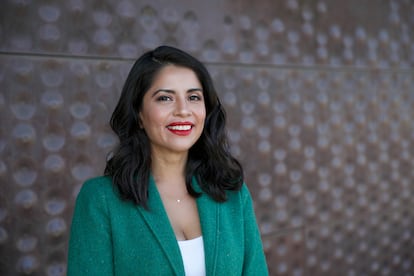Lupe M. Rodríguez, executive director of the Latina Institute: ‘The separation of immigrant families is a violation of reproductive rights’
Three years after the Supreme Court overturned the constitutional right to an abortion, the expert reflects on the impact it has had on immigrant communities


Lupe M. Rodríguez, 42, has always had one foot in immigrant rights and the other in health care rights. She’s known from an early age that immigrants like herself are at the center of the fight for accessible health care for all. Rodríguez, who was born in Mexico City, came to the United States at the age of three with her parents so that her brother, who had spinal muscular atrophy, a neurodegenerative disease, could get treatment. Her family quickly realized that in order for her brother to live a fuller life, they should remain in the U.S. Her father was one of the millions of undocumented immigrants who were able to legalize their status under the Immigration Reform and Control Act of 1986, after having worked as a farmworker in the country.
“Throughout my life growing up, I got a really early exposure to advocacy on the health care side. I was six or seven years old, translating medical documents for my families. I was also exposed to the inequities in health care that many of us experience because of our immigration status,” Rodríguez tells EL PAÍS via phone call. “My lifelong quest in my work has been to fight back on that and to ensure that we have a change in my lifetime around who has access to health care in this country,” she adds.
A quest that in 2019 led her to become the executive director of the National Latina Institute for Reproductive Justice (Latina Institute), the only national reproductive justice organization dedicated to advocating for Latinas specifically. Work that became all the more important in 2022, when the Supreme Court overturned the constitutional right to an abortion in what is commonly referred to as the Dobbs decision. Since then, Latinas have been the most affected by abortion bans across the country. According to a study by the Institute, as of June 2023, 6.7 million Latinas, or 43% of all Latinas of reproductive age, lived in states that had banned or were likely to ban the procedure.
In addition to the abortion bans or restrictions on the procedure, which are now in place in 19 states, Latinas face a series of barriers: they tend to be poorer and lack access to private health insurance, live in areas with fewer health care providers, and struggle with a language barrier, among others. Added to this is the Trump administration’s anti-immigration crusade and mass deportation efforts, which have significantly worsened their access to reproductive health care three years after the Supreme Court ruling.
Question. What is the current panorama like for Latinas in terms of access to reproductive health care amidst president Donald Trump’s immigration crackdown?
Answer. Even before the really grave and critical anti-immigrant rhetoric and actions that are happening right now, our immigrant communities have faced barriers in access to reproductive health care because of fear of going to places where they could be detained. Even though before this administration there were laws that protected those spaces, there was still that fear. Also, preceding this administration, there have been internal immigration checkpoints at border states. We know this specifically in the work that we do in Texas, where there are immigration check points up to 100 miles inside the border of Texas, which, for a long time, folks have feared crossing for fear of being arrested. All of those things have come together at this moment, three years after Dobbs, to create a situation where access to care that was already bad has gotten worse for our communities.
Q. What else has the Trump administration done to make the situation worse?
A. After the Dobbs decision, the Biden administration put in place a lot of protections related to emergency medical treatment, such as the EMTALA law, which provided a very specific and direct guidance to states where abortion bans exist, that they have to continue to provide emergency abortion care to people who need it. The current administration has rescinded that guidance, so they’re basically saying that these states can choose not to provide emergency abortion care when it’s needed in a life or death situation. We also know that there’s been an uptick in people who are being investigated or arrested for their pregnancy outcomes. Something that was not happening at the same level before, and certainly not by the federal administration. People are going to emergency rooms with miscarriages, and in some cases are being investigated or arrested under suspicion of having caused them.

Q. What about the cuts to Medicaid, how do those affect Latinas and immigrant women?
A. Right after the Dobbs decision, providers in some of the states with bans left the states. So there are documented shortages of providers in places like Texas, Idaho or Georgia, and what we have found is that particularly in rural parts of those states, people don’t have access to other types of reproductive health care, not just abortion. There aren’t just enough providers to provide prenatal care or birth control, for example. Those things have now been exacerbated with the potential cut to funding to Medicaid programs, which a lot of our communities depend on. The future of where folks will be able to get any type of care, regardless of whether it’s abortion care, is very much under threat.
Q. That also contributes to more women having to travel longer distances for reproductive health care, something we know immigrant women can’t afford to do, since by leaving their houses they run the risk of being detained or even deported.
A. Right, and even before this administration came in, we knew that people just don’t have the resources to do that. You have to have the money to pay for travel and you have to be able to take time off from work and get childcare if needed. But also the heightened anti-immigrant rhetoric, enforcement and raids are absolutely causing a case where folks don’t even risk getting on the road.
Q. Do you know of any cases of Latina immigrants being detained while seeking out an abortion or any type of reproductive health care?
A. In some isolated cases we have heard that immigration enforcement was going to maternity wards, but we haven’t heard of anybody being detained for seeking abortion care. Not yet, anyway.
Q. What is access to reproductive health care like inside immigrant detention centers?
A. We have data from the first Trump administration, and so we know that detention centers in general do not have great access to health care, but certainly not to reproductive health care. Under the first Trump administration, for example, there were many cases in detention centers where people needing abortion care were being illegally denied that care by the federal government. This was before the Dobbs decision went into effect, when abortion was still legal and protected by the Constitution nationwide.
Q. Trump is obviously not going to do anything to restore the right to an abortion, so what can be done?
A. What is really necessary right now is to continue to have accurate information for people to counter misinformation. We know misinformation is particularly targeting our communities, that a lot of misinformation is distributed in Spanish and through social media channels. So, we’re combating that through our work on the ground, turning folks to where they can get correct information about what their rights are, about where they can get care and about what they can do to support their communities. Another thing that we can do is work together with other organizations because reproductive rights and immigrant rights are connected. We feel strongly that the separation of immigrant families is a violation of reproductive rights and reproductive justice, and it should be talked about by both movements. That conversation is ever more important right now when our communities are being attacked through an immigration perspective, but again, in a way that is entirely tied to our reproductive and bodily autonomy.
Sign up for our weekly newsletter to get more English-language news coverage from EL PAÍS USA Edition
Tu suscripción se está usando en otro dispositivo
¿Quieres añadir otro usuario a tu suscripción?
Si continúas leyendo en este dispositivo, no se podrá leer en el otro.
FlechaTu suscripción se está usando en otro dispositivo y solo puedes acceder a EL PAÍS desde un dispositivo a la vez.
Si quieres compartir tu cuenta, cambia tu suscripción a la modalidad Premium, así podrás añadir otro usuario. Cada uno accederá con su propia cuenta de email, lo que os permitirá personalizar vuestra experiencia en EL PAÍS.
¿Tienes una suscripción de empresa? Accede aquí para contratar más cuentas.
En el caso de no saber quién está usando tu cuenta, te recomendamos cambiar tu contraseña aquí.
Si decides continuar compartiendo tu cuenta, este mensaje se mostrará en tu dispositivo y en el de la otra persona que está usando tu cuenta de forma indefinida, afectando a tu experiencia de lectura. Puedes consultar aquí los términos y condiciones de la suscripción digital.








































